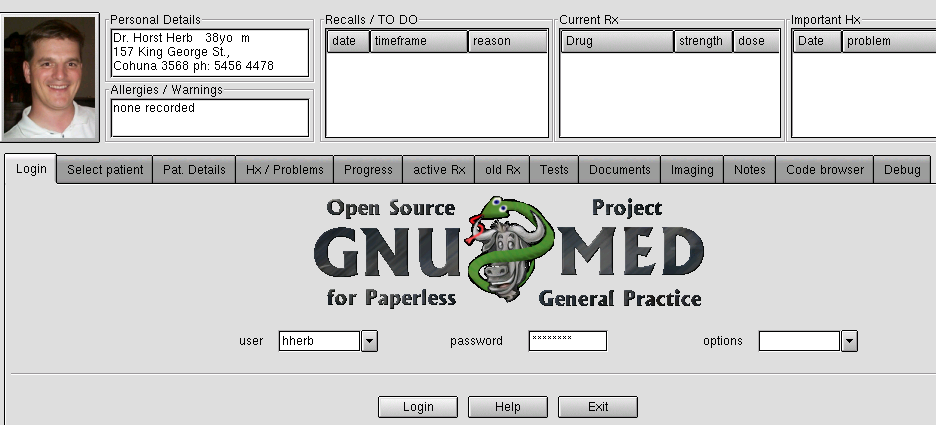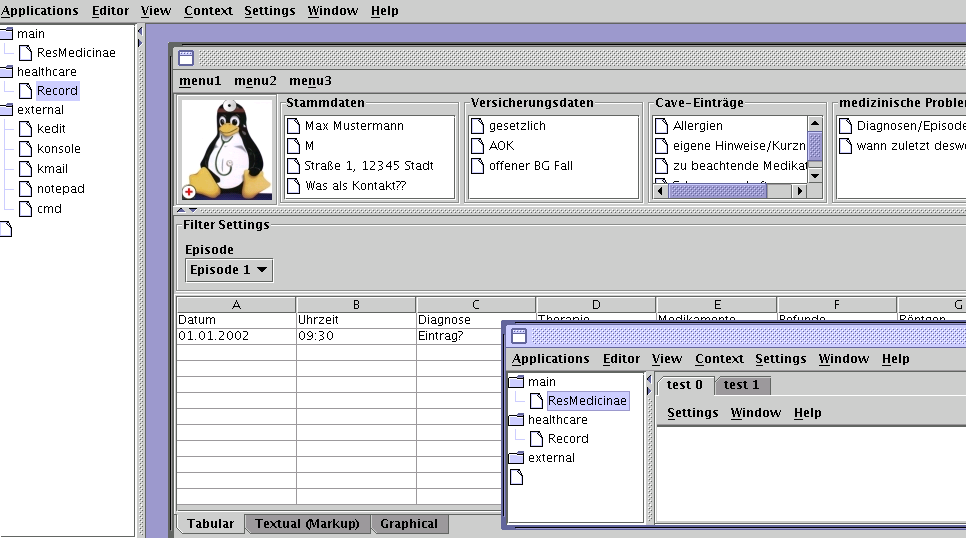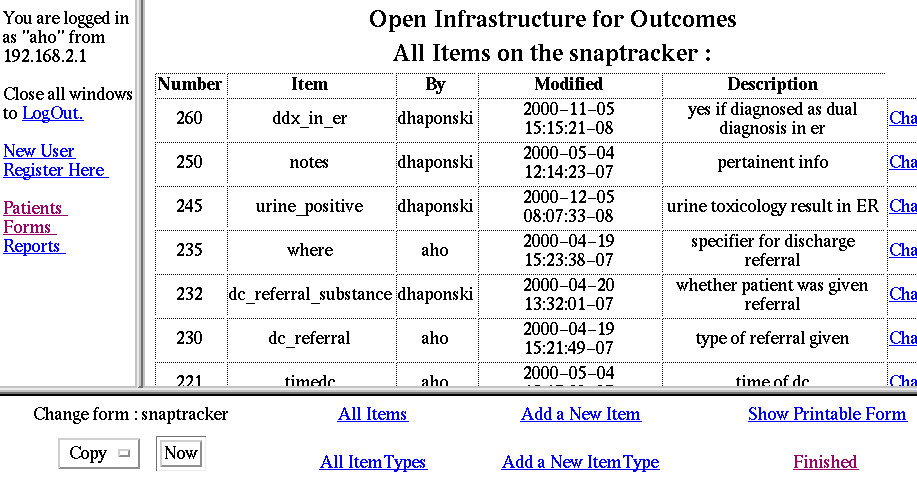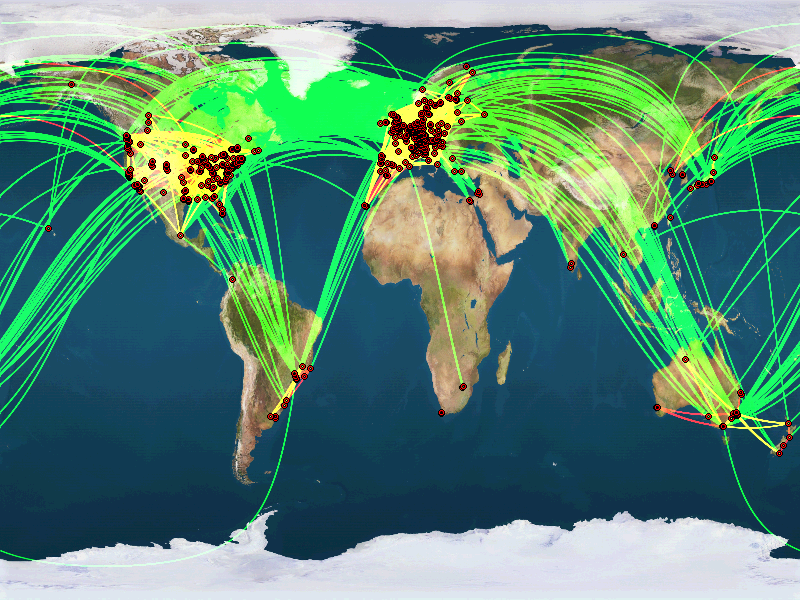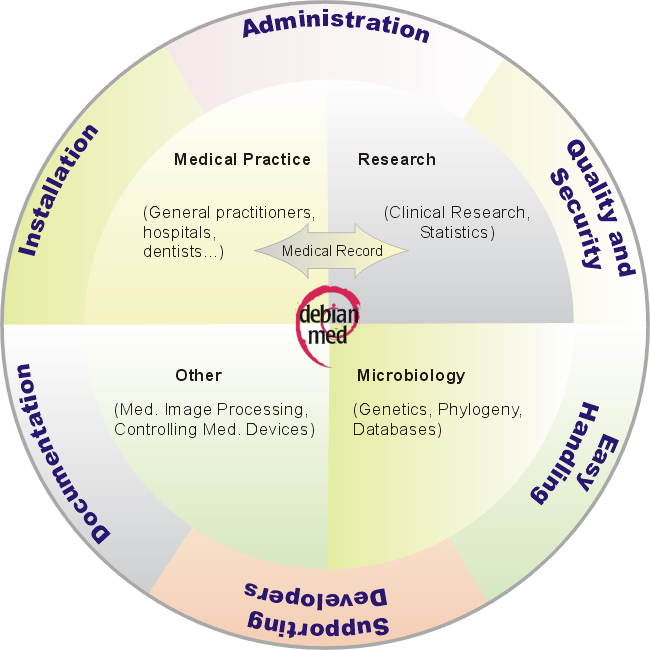The operating system Linux is widely established for servers of all
range and is gaining acceptance also for the tasks of end users at
desktop systems. The main arguments for this development are security
and total cost of ownership. There is a great interest in office
applications because there is a wide basis of users which enables the
necessary pool of developers of Free Software.
Regarding to special tasks for instance managing a medical practice
there is a much smaller set of users and thus the number of gifted
programmers among this set of users is drastically smaller compared to
everyday usage. However, in the last time Free Software also tried to
address several different special fields and there are chances that
also in those fields Free Software applications might possibly compete
against proprietary products.
By all means this trend makes sense also by a commercial point of
view. The need for support and maintenance in those special fields is
much higher than in more general applications and requires special
knowledge of competent experts. In this respect the pure costs of the
software license does not play an important role which enables
interesting business models for support.
The talk gives an overview about the current state of Free Software
for medicine ranging from medical practice management up to
microbiological research. Moreover it draws a sketch how all this
software will be integrated into the Debian GNU/Linux distribution by
the so called Debian-Med project. The reasons for the
advantages of an unique integrating platform will be discussed and
reasons were given why Debian GNU/Linux was chosen for this purpose.
Free Software in Health Care
Integrated software environment for all medical
tasks based on Debian GNU/Linux
|
| (page 1) |
Overview
- Motivation
- Status of Free Software for medicine
- What is Debian?
- What is Debian-Med?
- Why use Debian for medical care?
- How does it work?
- Summary: Goals of Debian-Med
- Future
|
| (page 2) |
Motivation
- General practice
- Secure and trustworthy paperless practice management
- Easy and fast handling
- Outpatient Care
- Secure and trustworthy clinical administration
- Standardised medical record exchange
- Medical science
- Open platform for telepathology
- Open environment for medical studies
- Microbiology
- Easy to use environment for analysis of protein and DNA
sequences
- Portable data formats
|
| (page 3) |
Profile of target users
- Mostly less technically competent
- Unable to install upstream programs easily enough
effort
- Not interested in administration of operating system
- Interested in a limited subset of available Free Software
- Needing easy usage
- Needing security and confidence
- Needing native-language documentation and interface
→ Any solutions for those users?
Yes and No
|
| (page 4) |
Status of Free Software for medicine
- Orphaned upstream
- Strange Licenses
- Hard to use because of lacking GUI
- Porting issues (architectures, byte order, 32 vs 64 bit)
- Data format not exchangeable
- Parallel development of the same functionality
- Based on ill-suited tools or backends
- Target users have no idea how to install this stuff
|
| (page 5) |
GnuMed
|
| (page 6) |
Torch (formerly known as FreePM)
- Technology: Zope
- Drawback: Currently only browser interface
- Difference to other programs: object-oriented XML database (ZODB)
- already in production
|
| (page 7) |
Res Medicinae
- Technology: Java (causes trouble with license)
- promising but far from ready
|
| (page 8) |
Tk Family Practice
- Technology: Tcl/Tk - portable but quite unsuitable for larger projects,
additional Web-Client, self made database back end
- Already in production
|
| (page 9) |
OIO - Open Infrastructure for Outcomes
- Out-patient care, robust, flexible
- Technology: Zope + PostgreSQL
- Drawback: Only browser interface
- Besides predefined forms each user is able to define new ones
|
| (page 10) |
More medical practice management
- FreeMed
- Technology: PHP + MySQL
- No appropriate database back end (PHP + MySQL)
- Development stalled
- SQL Clinic
- Psychiatric housing
- PostgreSQL + Perl web interface
- ... and others ...
|
| (page 11) |
|
|
| (page 12) |
Reasons for this variety?
- Historical reasons
- Less popularity
- Different technological decisions
- Different concepts
|
| (page 13) |
|
1. Free Redistribution
The license of a Debian component may not restrict any party from
selling or giving away the software as a component of an aggregate
software distribution containing programs from several different
sources. The license may not require a royalty or other fee for such
sale.
2. Source Code
The program must include source code, and must allow distribution in
source code as well as compiled form.
3. Derived Works
The license must allow modifications and derived works, and must allow
them to be distributed under the same terms as the license of the
original software.
4. Integrity of The Author's Source Code
The license may restrict source-code from being distributed in modified
form _only_ if the license allows the distribution of "patch files"
with the source code for the purpose of modifying the program at build
time. The license must explicitly permit distribution of software built
from modified source code. The license may require derived works to
carry a different name or version number from the original software.
(This is a compromise. The Debian group encourages all authors not to
restrict any files, source or binary, from being modified.)
5. No Discrimination Against Persons or Groups
The license must not discriminate against any person or group of
persons.
|
| (page 14) |
|
6. No Discrimination Against Fields of Endeavor
The license must not restrict anyone from making use of the program in
a specific field of endeavor. For example, it may not restrict the
program from being used in a business, or from being used for genetic
research.
7. Distribution of License
The rights attached to the program must apply to all to whom the
program is redistributed without the need for execution of an
additional license by those parties.
8. License Must Not Be Specific to Debian
The rights attached to the program must not depend on the program's
being part of a Debian system. If the program is extracted from Debian
and used or distributed without Debian but otherwise within the terms
of the program's license, all parties to whom the program is
redistributed should have the same rights as those that are granted in
conjunction with the Debian system.
9. License Must Not Contaminate Other Software
The license must not place restrictions on other software that is
distributed along with the licensed software. For example, the license
must not insist that all other programs distributed on the same medium
must be Free Software.
Example Licenses
The "GPL", "BSD", and "Artistic" licenses are examples of licenses that
we consider "free".
|
| (page 15) |
What is Debian?
- Linux is just the kernel of your operating system.
- You need a lot of applications around.
- Those collections of software around the Linux kernel are called distributions.
- Companies that build such distributions are called distributors.
- They make money by selling their distributions in boxes, doing support and training.
- You might know Mandrake, RedHat, SuSE and others.
- Debian is just one of them.
|
| (page 16) |
Sorry.
That was wrong.
|
| (page 17) |
|
The Debian Project is an association of individuals who have made
common cause to create a free operating system. This operating system
that we have created is called
Debian GNU/Linux,
or simply Debian for short.
Moreover, work is in progress to provide Debian for other kernels,
including in particular the Hurd and NetBSD. There have even been
discussions of a possible port to Windows.
|
| (page 18) |
Web of trust
|
| (page 19) |
Differences to other distributions
- Debian is not a company but an organisation.
- It does not sell anything.
- Debian members - generally called maintainers - are volunteers.
- Maintainers are working on a common goal: building the best operating
system they can
- Largest collection of ready-to-install Free Software on the Internet
- Two ways to obtain Debian GNU/Linux
- Buying it from any other distributor on CD
- Downloading from the Web for free
- The latter is the common way and there are really great tools to do it this way.
|
| (page 20) |
What is Debian-Med?
- Debian internal project
- Completely integrated into Debian
- Taking care of medical software already included in Debian
- Packaging and integrating other medical software
- Maintaining a general infrastructure for medical users
|
| (page 21) |
History of Debian-Med
Thus the Debian developers who attended the conference had some
Bordeaux wine at first ...
|
| (page 22) |
History of Debian-Med (continued)
... and prepared a talk afterwards when somebody said the alarming words:
There is a laptop open!
That way the idea was born.
The official start of the Debian-Med project was in January 2002.
|
| (page 23) |
Goals in detail
Example: Dental Practice
- OdontoLinux
→ PostgreSQL, PHP, Debian package available
- LinuDent
→ Tcl/Tk, shared code with Tk Family Practice
Authors now are in touch ...
→ Goal of Debian-Med: Integration
|
| (page 24) |
Microbiology
- Debian contains a number of packages to analyze DNA and protein
sequences
- Different state of development
- Different licenses
- Sometimes not DFSG compatible
- Avoids wide distribution
- Problems
- Incompatible data formats
- Problems on different hardware platforms
- Different usage
→ Goal of Debian-Med: Apply Debian standards of quality
|
| (page 25) |
Missing Free Software solutions
- Drug database
- Pharmacy
- Physical therapy
- Veterinary practice
→ Goal of Debian-Med: Supporting developers
|
| (page 26) |
Special fields
- Medical imaging
- Different proprietary image formats of medical
devices
- Licensing and patent problems
- Control of medical devices
- Replacements of proprietary software on non-free systems
with drawbacks regarding to functionality and
security
→ Goal of Debian-Med: Indicate advantages
of Free Software to programmers
|
| (page 27) |
Complex problems
- medical research
- powerful Applications (DHCP / VISTA)
- telepathology (ipath)
- medical record / data exchange
→ Goal of Debian-Med: Demanding solid packaging
|
| (page 28) |
Documentation
- "Traditional" weakness of Free Software
- Possibility to give contribution without high technical
skills!
- Medicine HOWTO
- Part of Linux Documentation Project (LDP)
- Description of existing free medical software
- Translation would be great
- Resmedicinae Analysis Document
- Analysis of existing programs
- Specification of requirements on practice management
software
- Only rudimentary English translation
- Need for this kind of analysis documents for other
fields
→ Goal of Debian-Med: Packaging documentation and translations
|
| (page 29) |
|
|
| (page 30) |
Why use Debian for medical care?
- Focus on security and stability
- Powerful packaging tools
- Strong quality assurance, carefully tested
- Strict rules (policy)
- Support of 11 hardware architectures
(auto builders: alpha, arm, hppa, i386,
ia64, m68k, mips, mipsel, powerpc, s390,
sparc)
- Developed by about 1000 volunteers
- Single developers have influence on development - they just
have to do it
|
| (page 31) |
How does it work?
- Collection of medical software by meta packages
→ No research for available medical software
necessary
→ User is not forced to browse the whole
package list of Debian
→ Easy comparison between software
covering the same task
→ Safety against accidental removal of
dependencies
→ Conflicts to incompatible packages
→ Easy installation
→ Low effort for administration
- Adapted configuration inside meta packages
→ Care for special needs of Debian-Med users
- Documentation packages
→ Packaging and creating relevant documentation
→ Translation
|
| (page 32) |
Role: Debian-Med user
- System administrator defines group of medicine users
- Extra menu "Med"
- Users of role Med could have extra configuration
- Do not bother other users with those additional stuff
Debian-Med does not develop medical software.
It just smoothly packages third-party software for Debian.
|
| (page 33) |
Summary: Goals of Debian-Med
- Integration of medical software
- Apply Debian standards of quality to medical software
- Supporting developers
- Indicate advantages of Free Software to programmers
- Solid packaging for huge software which is hard to install
- Providing documentation and translation
|
| (page 34) |
Problems for implementation
Certification
- Health insurance companies demand correct supply of data
- User interest in accurate accounting
- → Only providers who are able to provide accurate data
will stay in the market
- → No difference between Open and Closed Source
- → BMfGS (German Ministry of Health and Social Care):
Certification of Open Source by Health insurances is possible
- → Precedent: Firmware for some ISDN-cards in Linux-Kernel
|
| (page 35) |
Problems for implementation (2)
Changed guidelines by law
- Short-dated changes necessary
- → Commercial support is necessary
- → Requirement of expert know-how (medical informatics)
- → Business model: Support for medical Free Software
- Software free of charge
- Earning money by
- Consulting
- Installation
- Support
- Updating
|
| (page 36) |
Future
- Only first steps
- Some meta packages ready
- Great interest from developers and users
- First version in Woody+1
- Knoppix based Live-CD
|
| (page 37) |
Further Information
|
| (page 38) |
